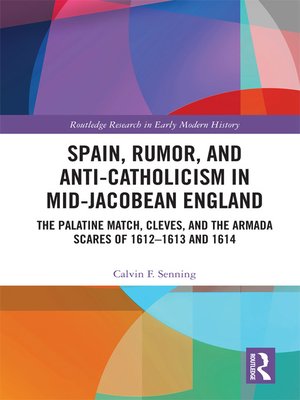Spain, Rumor, and Anti-Catholicism in Mid-Jacobean England
ebook ∣ The Palatine Match, Cleves, and the Armada Scares of 1612-1613 and 1614 · Routledge Research in Early Modern History
By Calvin F. Senning

Sign up to save your library
With an OverDrive account, you can save your favorite libraries for at-a-glance information about availability. Find out more about OverDrive accounts.
Find this title in Libby, the library reading app by OverDrive.



Search for a digital library with this title
Title found at these libraries:
| Library Name | Distance |
|---|---|
| Loading... |
Geoffrey Parker has remarked that the Spanish Armada, though a disastrous defeat, was a considerable psychological success. Deep into the seventeenth century the specter of a returning armada haunted England. Twice in the middle of James I's reign alarms occurred. One grew out of the king's plan, opposed by Spain, to marry his daughter Elizabeth to the Calvinist elector of the Palatinate. The other derived from a rekindling of the disputed succession in the Cleves-Jülich duchies in the lower Rhineland, into which Spanish forces intervened militarily, while England suspected the formation of a large Spanish-led Catholic league, seemingly bent on invasion, which caused a few days of panic in London. Both scares were based on misinformation and rumor, worsened by longstanding English anxiety over Spanish designs and doubts about the loyalty of English Catholics, the persecution of whom intensified. The latter scare occasioned the appearance in London of a satirical print, long thought in England to be lost, of James holding the pope's nose to the grindstone, but a copy sent to Madrid by the Spanish ambassador has survived, and, reproduced here, preserves what appears to be the oldest known example of English political satire in the print medium.







